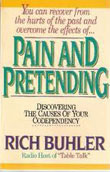Relationships and
boundaries in dysfunctional family are always violated.
Besides other factors, it happens because of controlling behaviour both from dependent person (alcoholic, aggressor, drug addict, etc.) and
often from co-dependent (spouse and
children, who adopt roles for survival).
So what's the difference between healthy and controlling families ?
Why child from such a family, being an adult, experiences multiple difficulties ?
Controlling Families:
1. Conditional
Love
- Parents love is
given as reward but withdrawn as punishment
- Parents feel
their children "owe" them
- Children have to
"earn" parental love
|
|
Healthy Families:
1. Nurturing
Love
- Parental love is
relatively constant
- Children get
affection, attention, and nurturing touch
- Children are
told they are wanted and loved
|
|
2. Disrespect
- Children are
treated as parental property
- Parents use
children to satisfy parental needs
|
|
2. Respect
- Children are
seen and valued for who they are
- Children's
choices are accepted
|
|
3. Stifled
Speech
- Communication is
hampered by rules like "Don't ask why" and "Don't say no"
- Questioning and
dissent are discouraged
- Problems are
ignored and denied
|
|
3. Open
Communication
- Expressing
honest thought is valued more than saying something a certain way
- Questioning and
dissent are allowed
- Problems are
acknowledged and addressed
|
|
4. Emotional
Intolerance
- Strong emotions
are discouraged or blocked
- Feelings are
considered dangerous
|
|
4. Emotional
Freedom
- It's okay to
feel sadness, fear, anger or joy
- Feelings are
accepted as natural and give us information
|
|
5. Ridicule
- Children feel on
trial
- Children are
criticized more than praised
|
|
5.
Encouragement
- Children's
potentials are encouraged
- Children are
praised when they succeed and given compassion when they fail
|
|
6. Dogmatic or
Chaotic Parenting
- Discipline is
often harsh and inflexible
- Parents see
their role as bosses who make their children obey
- Parents give
children little privacy
|
|
6. Consistent
Parenting
- Parents set
appropriate and consistent limits
- Parents see
their roles as guides and leaders who follow through with rewards and
consequences for behaviors
- Parents allow
children some reasonable control over their own bodies and activities
|



